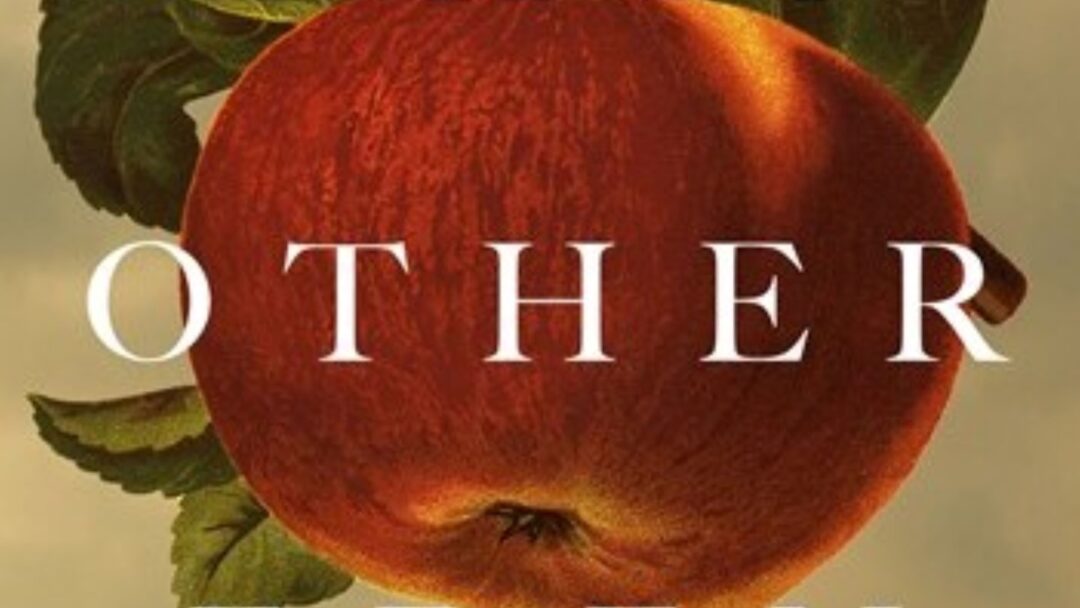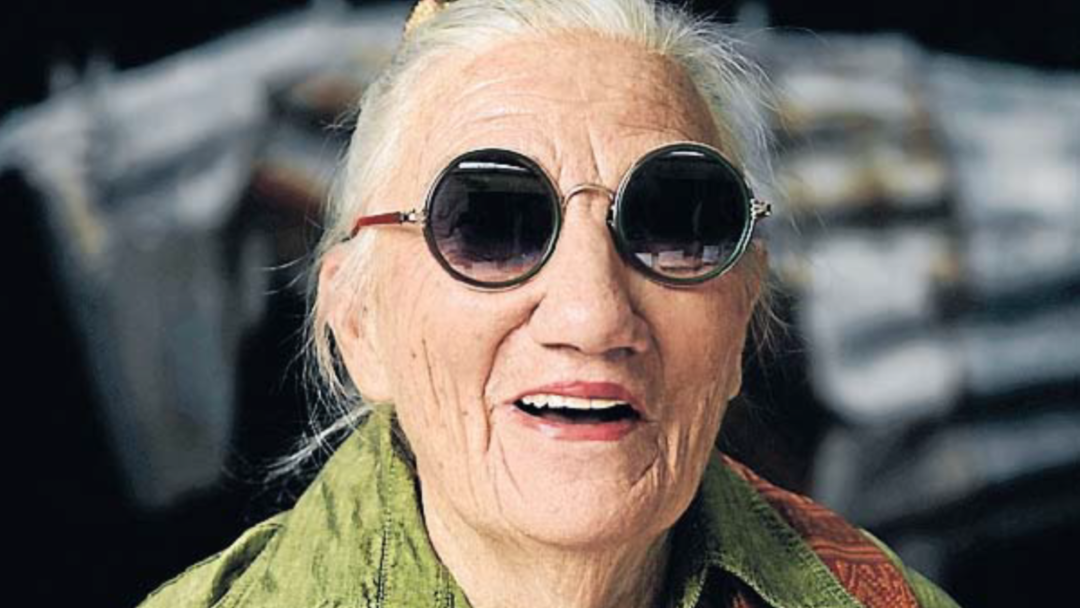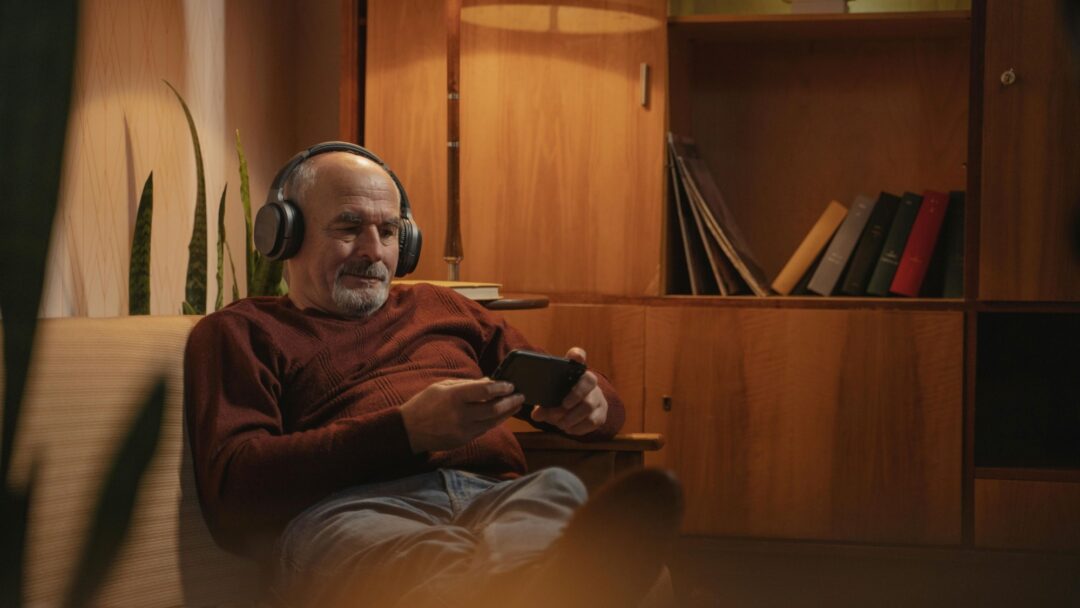Audio
Tomorrow, Questions, Mistresses and Murder
Hear This by
Vision Australia3 seasons
25 October 2024
28 mins
Reviews and readings from Australian, British and US books in the Vision Australia Library.

This series features publications and events in the Vision Australia library for people with blindness or low vision. Host Frances Keyland presents reviews, readings and Reader Recommends.
This edition includes reviews and selected readings from Australian, British and US fictional and non-fictional novels.
You can find out more about the Vision Australia Library or make contact at its website.
00:30 UU (THEME)
Let's. Take a look. To take a look inside the book. Take a look...
00:49 S1
Hello and welcome to Hear This. I'm Frances Keyland, bringing you the Vision Australia Library radio program. And today we've got some lovely books, some samples of those books. So I do hope you enjoy today's show. I was most excited when I logged on to the library catalog. I think it was Thursday, and yes, found the new catalog and all of its great new features, including the ability to search by narrator so you can look up your favorite narrators now, and also key word search. So if there's a topic that you're really interested in, you can now find it by just putting in the word or the term, and we'll come up with books that have that not only in the title but in the synopsis as well. And another great feature is being able to search by your favorite subject country. Life. Fiction, crime. Mystery.
Also, the record of the books gives you an indication of whether there are high levels of sex, bad language, or violence in the books now so you can curate your own library. Borrowing. Fabulous! I was so excited when I logged on and found all this was available. So look, let the library know how you're going with the new catalog if you're using it, because that feedback is just wonderful for the library to know, and it seems pretty seamless. I've had no hiccups, so I hope everybody out there enjoys the new library catalog.
The first book I'd like to mention today is a book that I've been waiting forever for the library to get this. It's called Tomorrow and Tomorrow and Tomorrow. And it's by Gabrielle Zevin. This is the story of Sam and Sadie. It's not a romance, but it is about love. When Sam catches sight of Sadie at a crowded train station one morning, he is catapulted straight back to childhood and the hours they spent immersed in playing games. Their spark is instantly reignited and sets off a creative collaboration that will make them superstars. It is the 90s and anything is possible. What comes next is a decades long tale of friendship and rivalry, fame and art, betrayal and tragedy. Perfect worlds and imperfect ones, and above all, our need to connect, to be loved and to love. Here is a sample of Tomorrow and Tomorrow and Tomorrow by Gabrielle Zevin. It's narrated by Julian Sheehy.
03:21 S2
Before Mazer invented himself as Mazer, he was Samson Maser, and before he was Samson Maser, Mazer, he was Samson Maser, Monsieur. A change of two letters that transformed him from a nice, ostensibly Jewish boy to a professional builder of worlds. And for most of his youth, he was Sam. Sam on the Hall of Fame of his grandfather's Donkey Kong machine. But mainly Sam. On a late December afternoon in the waning 20th century, Sam exited a subway car and found the artery to the escalator, clogged by an inert mass of people who were gaping at a station. Advertisement. Sam was late. He had a meeting with his academic advisor that he had been postponing for over a month, but that everyone agreed absolutely needed to happen before winter break.
Sam didn't care for crowds being in them or whatever foolishness they tended to enjoy en masse, but this crowd would not be avoided. He would have to force his way through it if he were to be delivered to the above ground world. Sam wore an elephantine navy wool peacoat that he had inherited from his roommate Marx, who had bought it freshman year from the Army Navy surplus store in town. Marx had left it moldering in its plastic shopping bag just short of an entire semester, before Sam asked if he might borrow it. Baths. That winter had been unrelenting, and it was an April nor'easter. April? What madness! These Massachusetts winters that finally wore Sam's pride down enough to ask Marx for the forgotten coat.
Sam pretended that he liked the style of it, and Marx said that Sam might as well take it, which is what Sam knew he would say. Like most things purchased from the Army Navy surplus store, the coat emanated mold, dust, and the perspiration of dead boys.
05:20 S1
And that was Tomorrow and Tomorrow and Tomorrow by Gabrielle Zevin. Gabrielle is [spells author's name]. And that book goes for 13 hours and 52 minutes. No bad language, no violent content, and no coarse language, it says here. So, again, wonderful to be able to have those controls in place. This was published in 2022, and I've seen so many people reading it, and it's been listed as people's favorite books of the year. Goodreads calls it... An exhilarating novel. Two friends, often in love, but never lovers, come together as a creative partners, um, where success brings them fame, joy, tragedy, duplicity, and ultimately, a kind of immortality. It spans 30 years, from Cambridge, Massachusetts, to Venice Beach, California, and lands in between and far beyond.
The Guardian newspaper wrote... When... and this is from 18th of July, 2022, in The Guardian by Pippa Bailey... When Macbeth says of tomorrow and tomorrow and tomorrow, he speaks of the relentlessness and futility of life. When Gabriel Zevin employs the same word, she speaks of the possibility of infinite rebirth, infinite redemption. And the review finishes with,,, Tomorrow and Tomorrow and Tomorrow is an artfully balanced novel, charming but never saccharine. The world Zevin has created is textured, expansive and just like those built by her characters, playful.
The next book is Question 7 by Richard Flanagan, beginning at a love hotel by Japan's Inland Sea and ending by a river in Tasmania. Question 7 is about the choices we make about love, and the chain reaction that follows by way of H.G. Wells and Rebecca West's affair through the 1930s nuclear physics to Flanagan's father working as a slave laborer near Hiroshima when the atom bomb is dropped. This genre defying daisy chain of events reaches fission. When Flanagan, as a young man, finds himself trapped in a rapid on a in a rapid on a wild river, not knowing if he is to live or die. At once a love song to his island home and to his parents, this hypnotic melding of dream history, literature, place and memory is about how reality is never made by realists and how our lives so often arise out of the stories of others and the stories we invent about ourselves.
Let's hear a sample of Question 7 by Richard Flanagan. It's narrated, or it doesn't have the narrator here, it just says Human Voice.
08:09 S3
In the winter of 2012, against my better judgment, and for reasons that were not entirely to do with writing much as I said they were, and which even now are not clear to me, I visited the site of Ohama camp, Japan, where my father had once been interned. It was very cold, a bitter day, and an iron sky threw a foreboding cast on the inland sea beneath which my father had once worked in a coal mine as a slave laborer. Nothing remained, though I had no wish to be bothered with it. I was taken to a local museum, where a very helpful woman found numerous photographs documenting a detailed history of the coal mine from the early 20th century its growth, its processes, its Japanese workers. There was no photograph of slave laborers.
The woman was kind, and, as they say, a fount of knowledge about local history. She had never heard of slave labourers working at the Ohama coal mine. It was as if it had never Ever happened, as if no one had ever been beaten or killed or made to stand naked in the snow until they died. I remember the woman's tolerant smile, a smile of pity for me, thinking there had ever been slave laborers at the Ohama coal mine. Two. Sometimes I wonder why we keep returning to beginnings. Why we seek the single thread we might pull. To unravel the tapestry we call our life. In the hope behind it we will find the truth of why.
10:03 S1
So that is Question 7 by Richard Flanagan. Richard is [spells name]. And that's a very recent release, released in 2023. And it's great to have it in the library collection. There are many, many books by Richard Flanagan in the library collection. There's Death of a River Guide, again set around the waterways in a river in Tasmania. First person. Gould's Book of Fish, a novel in 12 fish, and that's also available in Braille. The Living Sea of Waking Dreams, also available in Braille and Narrow Road to the Deep North - maybe one of his best known novels, The Guardian, called it a masterpiece. The Narrow Road is an extraordinary piece of writing and a high point in an already distinguished career, and he did win the Man Booker Prize for that novel in 2014.
Now to one of the first writers to recreate Gothic romance, this is Victoria Holt and Mistress of Mellyn. It was the first novel published under the pen name of Victoria Holt, whose real name is Eleanor Hibbert. Set in 19th century England, Mistress of Mellyn weaves together elements from earlier Gothic novels such as Jane Eyre, The Woman in White and Rebecca. It became an international bestseller, and maybe with the Halloween library event coming up, it may be one that you would like to borrow. Mistress of Mellyn by Victoria Holt. Martha did not want to be a governess, but penniless and alone in the world, she had no choice. The Tremellen family, with its dark secret and eerie clifftop home, filled her with foreboding. Three governesses had preceded Martha at Mount Mellyn, a strange old Cornish mansion, and she felt compelled to solve some of its mysteries. Let's hear a sample of Mistress of Mellyn by Victoria Holt. It's narrated by Judith Wale.
12:10 S4
There are two courses open to a gentlewoman when she finds herself in penurious circumstances, my Aunt Adelaide had said. One is to marry and the other to find a post in keeping with her gentility. As the train carried me through wooded hills and past green meadows. I was taking this second course. Partly, I suppose, because I had never had an opportunity of trying the former. I pictured myself, as I must appear to my fellow travellers, if they bothered to glance my way, which was not very likely. A young woman of medium height, already past her first youth, being 24 years old, in a brown merino dress with cream lace collar and little tufts of lace at the cuffs. Cream being so much more serviceable than white, as Aunt Adelaide told me. My black cape was unbuttoned at the throat because it was hot in the carriage, and my brown velvet bonnet, tied with brown velvet ribbons under my chin, was of the sort which was so becoming to feminine people like my sister Phillida. But I always felt sat a little incongruously on heads like mine.
My hair was thick with a coppery tinge. Parted in the centre. Brought down at the sides of my two long face. And made into a cumbersome knot. To project behind the bonnet. My eyes were large in some lights, the colour of amber, and were my best feature, but they were too bold. So said my aunt Adelaide, which meant that they had learned none of the feminine graces which are so becoming to a woman. My nose was too short, my mouth too wide. In fact, I thought nothing seemed to fit. And I must resign myself to journeys such as this when I travel to and fro from the various posts which I shall occupy for the rest of my life, since it's necessary for me to earn a living.
14:18 S1
And that was a sample of Mistress of Mellyn by Victoria Holt. Victoria is [spells name]. Victoria Holt was born in 1906 and passed away in 1993. And that book goes for ten hours and 40 minutes.
The next book is Lenny Marks Gets Away with Murder by Australian author Kerryn Mayne. Lenny Marks is good at not remembering she has spent the last 20 years not thinking about the day her mother left her when she was still a child. Her stepfather's parting words, however, remain annoyingly unforgettable. You did this. Now 37, Lenny prefers contentment and order over the unreliability of happiness and the messiness of relationships. She fills her days teaching at the local primary school and her nights playing Scrabble with her pretend housemate, watching reruns of friends, and rearranging her 36 copies of The Hobbit recently, though, if only to appease her beloved foster mum. Leonie has set herself the goal of getting a life.
Then, out of the blue, a letter arrives from the adult parole board and when her desperate attempts to ignore it fail, Leonie starts to unravel. Worse, she starts to remember. Let's hear a sample of Leonie Marks Gets Away with Murder by Kerryn Mayne. It's narrated by Annie Maynard.
15:51 S5
Lenny Marks seldom found herself unprepared. Lessons for her grade five students were religiously compiled a fortnight in advance. Her tax return would be ready to submit no later than the 15th of July every year, and her home fire escape plan was reviewed and updated each summer. Leonie knew the location of both of Selby South primary Schools defibrillators and exactly how to use them. She serviced her bicycle regularly to keep it in prime shape, and carried a bottle opener on her set of keys. Despite never as yet needing it. She found tremendous peace in this level of organization, which was as close to happiness as Lenny Marx ever planned to be. Happiness, she knew, was unstable and quite unreliable. And Lenny was neither of those things. Instead, she aimed for the contentment of a routine which had served her quite well up to and into her 37th year. And still, despite knowing exactly what her Monday morning should contain.
Lenny now found herself under the unexpected and interrogating gaze of Mrs. Finley's office administration. The clock had barely ticked over 8 a.m., and Lenny had only just turned her teapot to the requisite three times the way her grandmother had taught her. Despite it apparently not making a jot of difference to the taste when Mrs. Finley bustled in to disturb the good order of things. So is it a secret husband. Mrs. Finley asked, eyes alarmingly wide and voice predictably loud, is what Lenny asked. Well, it's addressed to Helena Winters, and I didn't know who that was. A mistake, I thought, and was going to send it back. Return to sender. But Laura said, that's no mistake, that's Lenny Marx. Lenny, read the front of the envelope. Helena Winters, a name from long ago and of a girl she thought she'd left well and truly behind.
17:54 S1
That was Lenny Marx Gets away with Murder by Kerryn Mayne. Kerryn is spelt [spells name]. And that book goes for nine hours and 45 minutes. And I'm reading from The Age here. And this is an article that was published in on December the 26th by 2023. It's written by Caroline Webb. The headline is Burnt Out by Work and Kids and Searching for a Hobby... Kerryn wrote a best seller. She said I'd have always wanted to write a book, and it was author Sally Hepworth that lit the spark. Lenny Marks Gets Away with Murder was published in 2023, and Mayne said juggling the writing of Leonie with her job in the police force and parenting two children under three didn't faze her. I was a bit burnt out with work and that was all I was doing, said Mayne, who now has four children under six, including 16 month old twin girls.
Lenny Marks Gets Away With Murder, published by Penguin, is a bestseller and was shortlisted for the Ned Kelly Award for Best Debut Crime Fiction, and the book is set in a town like Belgrave in Melbourne's Dandenong Ranges. With some eccentric characters. Mayne has mainly been a police detective or uniform officer for 15 years, so she uses that knowledge to explore what might happen to a survivor years after the initial trauma.
Now to another Australian author, Enza Gandolfo, and her novel The Bridge. Did the dead exist? Were they watching? Were they ghosts? Not the kind he'd imagined as a child, draped with white sheets, with the ability to walk through walls. But the kind that lodged themselves in your heart, in your memories. The kind that came to you in dreams that you could see when you closed your eyes. And sometimes even when your eyes were opened. In 1970s Melbourne, 22 year old Italian migrant Antonello is newly married and working as a rigger on the Westgate Bridge, a gleaming monument to a modern city. When the bridge collapses 1st October morning, killing 35 of his workmates, his world crashes down on him. In 2009, Jo and her best friend Ashley are on the verge of finishing high school and flush with the possibilities for their future. But one terrible mistake sets Jo's life on a radically different course.
Let's hear a sample of this... novel by Enza Gandolfo, The Bridge. It's narrated by Taylor Owens.
20:29 S6
It was late Thursday morning during Paulina's third week with her grade three class. This was her fourth appointment as a replacement teacher, her second at the same school. Agnes Hunt, the permanent teacher who was now on maternity leave, had warned her that there were several mischief makers who needed constant surveillance and they'd already made themselves known. Marissa Pacelli had twisted her ankle doing backflips between the desks. The Pappagiorgio triplets had brought matches to school and set the bins on fire, and Gary Dyson spat hand-rolled paper missiles across the room whenever she wasn't looking. But more concerning to Paulina were the students who were struggling and found every activity a challenge. Terry, whose turn it was to read, was short and shy, with pale skin and green eyes that she hid behind a long fringe.
She stood up as one of the Pappagiorgio boys. Paulina hadn't got as far as telling them apart, passed her the book. She was trembling and already her face was turning red. Oh no. Not her. We'll be here all day! Yelled out Willie, the class talker, from the back of the room where he was supposed to be, facing the wall with his hands on his head in an enforced five minute silence. Giggles rippled along the desks. Paulina ignored him and focused on Terry. The girl's tongue flapped about, her lips opened and closed. She alternately sucked and bloated her cheeks, but nothing came out. It was as if the words were glue in her mouth. When she finally found her voice, some words came out in a rush of spit, while others were stretched beyond recognition as she painstakingly sounded out each letter around the room. Students were twitching and fiddling, and some were sniggering.
22:37 S1
And that was a sample of The Bridge by Enza Gandolfo. And that sets the opening of the book on the morning of that Westgate Bridge disaster. Enza is spelt [spells author's name]. I really enjoyed this book. It is very sad in parts and quite challenging to read because of the content, but I think it's a really, wonderfully, wonderfully created novel. The book was published in 2019 and was on the short list for the Stella Award Stellar Prize for that year, and I'm reading from The Guardian here from [?and] 19 by Camilla Nelson, and she writes...
This novel, set among migrant communities in Yarraville in Melbourne's west, explores how accidents of this magnitude not only waste the lives of those who die, but continue to haunt the living, who must struggle for a lifetime with the weight of trauma. This is a book about guilt, ambiguity and moral culpability. It searches amid half made lives, misguided dreams and murky realities, asking stern questions about responsibility and remorse.
And the last book to have a sample of today is by Daniel Mason, and its title is The Winter Soldier. Lucius, a young Viennese medical student, enlists hoping to serve at a field hospital in the First World War, but he finds a freezing outpost. The other doctors have fled. A single nurse remains, and Lucius has never lifted a scalpel. And as the war rages across the winter landscape, he finds himself falling in love with the woman from whom he must learn a brutal, makeshift medicine. Then one day, an unconscious soldier is brought in from the snow, his uniform stuffed with strange drawings. He seems beyond rescue until Lucius makes a fateful decision that will change the lives of doctor, patient and nurse forever.
Let's hear a sample of the Winter Soldier by Daniel Mason. It's narrated by Laurence Dobiesz.
24:48 S7
They were five hours east of Debrecen when the train came to a halt before the station on the empty plane. There was no announcement. Not even a whistle. Were it not for the snow draped placard, he wouldn't have known they had arrived. Hastening afraid he would miss the stop, he gathered his bag, his coat, his saber, pushing his way out through the men who filled the corridor of the train. He was the only passenger to descend further down the line. Porters unloaded a pair of crates onto the snow before jumping back on board, slapping warmth into their hands. Then the carriages began to move. Chains clanking, stirring his great coat and swirling snow around his knees.
He found the hussar in the station house with the horses brought in from the cold. Their ears flicked against the low ceiling, their long faces overhanging a bench where three peasant women sat, hands clasped over their swaddled bellies like fat men, content after a meal. Feet dangling just above the floor. Woman. Horse, woman. Horse, woman. The hussar stood without speaking. Back in Vienna, Lucius had seen regiments on parade with their plumes and coloured sashes. But this man was dressed in a thick grey coat with a cap of worn patched fur. Uh.
He motioned Lucious forward and handed him the reins of one of the horses before he led the other outside its tail, whisking across the women as it passed beneath the Habsburg double headed eagle on the door. Lucious tugged on the reins, but his horse resisted. He stroked her neck with the back of one hand. The broken one while he pulled with the other. Come, he whispered.
26:49 S1
And that was a sample of The Winter Soldier by Daniel Mason. Daniel is [spells name]. Daniel Mason is one of those authors that I discovered, thanks to one of our wonderful library members that recommended him. So there are also two other books by this wonderful author, The Piano Tuner and North Woods. The Winter Soldier was published in 2018.
Thank you so much for joining us on Hear This today. I'm Frances Keyland. If there are any of those books, strike your fancy and you'd like to listen to them, you can download them from the catalogue, or you can ring the library and ask them to organise that for you. The library's phone number is 1300 654 656. That's 1300 654 656. Or you can email the library at Vision Australia dot org - that's library@visionaustralia.org - and I hope everybody enjoys the new functions and the new capabilities of the library catalogue as it is now. And if there's any questions you want to know about how to find books, using the new search parameters that have been expanded, don't hesitate to contact the library. Have a great week and we'll be back next week with more Hear This.
Continue listening

On Hear This, latest books in the Vision Australia library. This edition, award-winning Oz fiction.
Australian fiction
Hear This by Vision Australia
4/8/2023
•28 mins
Audio

Books from the Vision Australia library - this episode featuring memoirs and family histories.
Family histories
Hear This by Vision Australia
11/8/2023
•27 mins
Audio

This edition: Michael Parkinson remembered and an assortment of latest books from the Vision Australia library.
Vale Michael Parkinson
Hear This by Vision Australia
18/8/2023
•26 mins
Audio

Hear This reviews latest books from Vision Australia library - this edition starting with two Booker Prize aspirants.
Booker Prize hopefuls
Hear This by Vision Australia
25/8/2023
•27 mins
Audio

Hear This interviews Tracey Chevalier, author of Girl with a Pearl Earring.
Girl with a Pearl Earring
Hear This by Vision Australia
8/9/2023
•28 mins
Audio

Hear This samples a variety of audio books from the Vision Australia library.
Top picks from audio books
Hear This by Vision Australia
15/9/2023
•28 mins
Audio

Events and activities at Vision Australia library - and latest picks from its books.
Community engagement
Hear This by Vision Australia
22/9/2023
•27 mins
Audio

This edition of Hear This from the Vision Australia library opens with a discussion of banned books.
Banned books
Hear This by Vision Australia
6/10/2023
•28 mins
Audio

Hear This features latest books and events at the Vision Australia library.
Latest events and books
Hear This by Vision Australia
13/10/2023
•27 mins
Audio

Latest books from the Vision Australia library - including childhood tales and a John Grisham thriller.
Childhood tales and a Grisham thriller
Hear This by Vision Australia
20/10/2023
•28 mins
Audio

Latest books from the Vision Australia library - including a novel by Australian Sam Drummond.
Oz writer Sam Drummond
Hear This by Vision Australia
3/11/2023
•27 mins
Audio

Books from the Vision Australia library - including a memoir by a friend of Anne Frank.
Anne Frank's friend
Hear This by Vision Australia
10/11/2023
•28 mins
Audio

Book reviews and excerpts from Vision Australia library - including a wartime struggle for survival.
Survival in wartime
Hear This by Vision Australia
24 November 2023
•27 mins
Audio

A special seasonal edition reviews Christmas murder stories available from Vision Australia library.
Yuletide Homicide
Hear This by Vision Australia
8 December 2023
•28 mins
Audio

Veteran talking book reader Tony Porter reviews his many voices.
The many voices of Tony Porter
Hear This by Vision Australia
5 January 2024
•27 mins
Audio

What's new in Vision Australia library of Braille and audio books - including new Australian works.
New Australian books
Hear This by Vision Australia
12 January 2024
•28 mins
Audio

Vision Australia librarian talks of coming events and latest books for people with blindness and low vision.
Coming events and new books
Hear This by Vision Australia
26 January 2024
•28 mins
Audio

Review of books from the Vision Australia library - from a broad international range.
Books from Japan, US, Australia and Sweden
Hear This by Vision Australia
2 February 2024
•27 mins
Audio

New books in the Vision Australia library - from E.L.Doctorow to Alan Bennett.
Reasons Not to Worry, Wild Things... and Alan Bennett
Hear This by Vision Australia
9 February 2024
•28 mins
Audio

Latest events and books from Vision Australia Library, featuring its Community Engagement Co-ordinator.
Vision Library latest with Leeanne
Hear This by Vision Australia
16 February 2024
•28 mins
Audio

Features Jamie Kelly of Vision Australia Library, updating us on its website catalogue. And other new books.
Vision Australia library online, and Jelena Dokic
Hear This by Vision Australia
23 February 2024
•29 mins
Audio

New books in the Vision Australia Library - in this edition, books about paintings.
Books about paintings
Hear This by Vision Australia
1 March 2024
•26 mins
Audio

From the Vision Australia Library, women's memoirs on International Women's Day.
Women's memoirs on IWD
Hear This by Vision Australia
8 March 2024
•28 mins
Audio

Coming events and books at Vision Australia Library for people with blindness or low vision.
Coming events at Vision Library - and a Kerouac classic
Hear This by Vision Australia
15 March 2024
•29 mins
Audio

Latest books from Vision Australia Library - this week, some top Oz and worldwide novels.
Top Oz and world novels
Hear This by Vision Australia
29 March 2024
Audio

Coming events at Vision Australia Library in connection with the Melbourne Writers' Festival.
Melbourne Writers' Festival
Hear This by Vision Australia
5 April 2024
•28 mins
Audio

Coming events and new books at the Vision Australia Library for blind and low vision people.
Event update and more new books
Hear This by Vision Australia
12 April 2024
•29 mins
Audio

How printed works are brought to life as audio books in the Vision Australia Library.
Audio book narrators
Hear This by Vision Australia
19 April 2024
•28 mins
Audio

ANZAC Day edition of this series from the Vision Australia library for people with blindness or low vision.
ANZAC sniper
Hear This by Vision Australia
26 April 2024
•28 mins
Audio

From the Vision Australia library: a South African childhood, AI issues and an American First Lady.
Apartheid, AI and Michelle Obama
Hear This by Vision Australia
3 May 2024
•27 mins
Audio

Forthcoming Vision Library events including those connected with the Melbourne Writers' Festival.
Melbourne Writers' Festival and Vision Library events
Hear This by Vision Australia
10 May 2024
•28 mins
Audio

Murder mystery novels available from the Vision Australia library are reviewed and sampled.
Murder mysteries
Hear This by Vision Australia
24 May 2024
•27 mins
Audio

Celebrating National Reconciliation Week with books from Vision Australia Library... plus some user favourites.
Reconciliation Week and Reader Recommends
Hear This by Vision Australia
31 May 2024
•27 mins
Audio

Reader Recommends and crime fiction from the Vision Australia library for blind and low vision people.
This Other Eden... and some other readin'!
Hear This by Vision Australia
7 June 2024
•29 mins
Audio

Vision Library's coming community events and latest books for people with blindness or low vision.
Coming events and latest books
Hear This by Vision Australia
14 June 2024
•29 mins
Audio

Books in Vision Australia library for people with impaired vision - this time on the theme of Darkness.
Darkness
Hear This by Vision Australia
21 June 2024
•29 mins
Audio

New books in Vision Library including the Wikileaks founder's autobiography.
Julian Assange - by the man himself
Hear This by Vision Australia
28 June 2024
•29 mins
Audio

Community events soon to happen at Vision Australia Library for people with blindness and low vision.
Coming events at Vision Australia Library
Hear This by Vision Australia
5 July 2024
•28 mins
Audio

Two well-known authors open the latest look at new publications in the Vision Australia Library.
Hilary Mantel, Bret Easton Ellis and more
Hear This by Vision Australia
19 July 2024
•27 mins
Audio

Vision Library series, this episode features new Australian crime novels written by women.
Australian sisters in crime
Hear This by Vision Australia
26 July 2024
•28 mins
Audio

Latest publications in the Vision Library, starting with a biography of John Farnham.
He's the Voice
Hear This by Vision Australia
2 August 2024
•27 mins
Audio

Latest reviews and readings from publications in the Vision Library for people with print disabilities.
Race, history and Black Ducks
Hear This by Vision Australia
9 August
•28 mins
Audio

Books from Vision Library reviewed include a Julie Andrews memoir, Guardian newspaper picks and more.
Julie remembers and The Guardian recommends
Hear This by Vision Australia
30 August 2024
•27 mins
Audio

An Australian author discusses her works, plus reviews of other books in the Vision Library.
Jane Rawson - author
Hear This by Vision Australia
6 September 2024
•28 mins
Audio

Update on forthcoming events and available publications at the Vision Australia Library.
What's On at Vision Australia Library
Hear This by Vision Australia
13 September 2024
•27 mins
Audio

Accessible Vision Library books reviewed, including murder mysteries and award nominees.
Mysteries and prize contenders
Hear This by Vision Australia
20 September
•27 mins
Audio

Reviews and events at Vision Australia Library to mark World Sight Day, October 10.
World Sight Day and Barbra Streisand
Hear This by Vision Australia
4 October 2024
•28 mins
Audio

What's on in the Vision Library, and the works of Ira Levin and Han Kang.
Library events, Ira Levin and Han Kang
Hear This by Vision Australia
11 October 2024
•28 mins
Audio

Vision Library publications reviewed - opening with some tributes to writers passed.
Tributes, and more
Hear This by Vision Australia
18 October 2024
•28 mins
Audio

Reviews and readings from Australian, British and US books in the Vision Australia Library.
Tomorrow, Questions, Mistresses and Murder
Hear This by Vision Australia
25 October 2024
•28 mins
Audio

Reviews and readings from books available in the Vision Australia Library.
From Australian thrillers to the US and South Africa
Hear This by Vision Australia
1 November 2024
•28 mins
Audio

A wide range of books in the Vision Australia Library are reviewed and sampled.
Leonard Cohen, ghosts and Broken Hill
Hear This by Vision Australia
8 November 2024
•28 mins
Audio

Events and publications at Vision Australia Library for people with blindness or low vision.
Vision Library: what's in and what's on
Hear This by Vision Australia
15 November 2024
•28 mins
Audio

Interview with an award-winning author about her life and work... plus more publications in the Vision Australia Library.
Jacqueline Bublitz
Hear This by Vision Australia
22 November 2024
•28 mins
Audio

Vision Australia Library for people with vision impairment updates its coming events and latest publications.
Coming soon to the Vision Library
Hear This by Vision Australia
13 December 2024
•28 mins
Audio

Christmas-themed books in the Vision Australia Library for people with vision impairment.
Christmas offerings
Hear This by Vision Australia
20 December 2024
•28 mins
Audio

New books for 2025, fiction and non-fiction - vale Leunig!
Fiction and non-fiction for the New Year
Hear This by Vision Australia
3 January 2025
•27 mins
Audio

Reviews of varied books from the Vision Library - some centring on radio stations or radio plays.
Radio drama
Hear This by Vision Australia
10 January 2025
•29 mins
Audio

What's On at Vision Australia Library - and latest publications accessible to people with blindness and low vision.
Coming events in 2025 - and latest publications
Hear This by Vision Australia
24 January 2025
•28 mins
Audio

Writings on Marianne Faithfull and award-contending works in the Vision Australia Library are reviewed.
Vale Marianne... and award-nominated books
Hear This by Vision Australia
31 January 2025
•28 mins
Audio

Special guest highlights interesting events in libraries around the country... and some new books.
What's new in libraries around Australia
Hear This by Vision Australia
7 February 2025
•27 mins
Audio

Accessible publications chosen for February 14: Library Lovers' Day, Valentines Day and World Radio Day.
Library Lovers' Day
Hear This by Vision Australia
14 February 2025
•29 mins
Audio

An update on Vision Australia Library's coming events and latest blind-accessible books.
Coming events and new books
Hear This by Vision Australia
25 February 2025
•29 mins
Audio

Reviews of accessible books including a John Steinbeck classic, and news of a forthcoming writers' festival.
Brimbank and Steinbeck
Hear This by Vision Australia
28 February 2025
•29 mins
Audio

Coming courses and other events at Vision Australia Library - and latest accessible books.
Courses, events and latest publications
Hear This by Vision Australia
14 March 2025
•28 mins
Audio

Special with interviews and readings at a writers' festival and writing competition in Melbourne.
Brimbank Writers' and Readers' Festival and Micro-fiction Competition
Hear This by Vision Australia
21 March 2025
•30 mins
Audio

An interview with an Australian woman writer and reviewer, about her favourite female authors.
Women authors with Stella Glorie
Hear This by Vision Australia
28 March 2025
•29 mins
Audio

Reviews and excerpts from accessible works in the Vision Australia Library, starting with a new Australian novel.
Reader recommends a Deal
Hear This by Vision Australia
4 April 2025
•27 mins
Audio

Vision Australia Library brings news of accessible events at the forthcoming Melbourne Writers' Festival.
Melbourne Writers' Festival 2025
Hear This by
11 April 2025
Audio

Vision Australia Library pays tribute to the late Australian author of the Miss Fisher mysteries and more.
Vale Kerry Greenwood
Hear This by Vision Australia
18 April 2025
•28 mins
Audio

ANZAC Day special featuring reviews and short readings from books about the First World War.
Reading about World War 1
Hear This by Vision Australia
25 April 2025
•28 mins
Audio

Reviews and readings of user favourites in Vision Library - including an Antarctic adventure.
Reader recommended
Hear This by Vision Australia
2 May 2025
•28 mins
Audio

What's accessible in the Vision Australia Library - including new books by Kate Grenville and Eric Idle.
Always look on the bright side of... time and place
Hear This by Vision Australia
9 May 2025
•29 mins
Audio

First part of an interview with an Australian author, military historian and war veteran.
Barry Heard's true tales of war (part 1)
Hear This by Vision Australia
16 May 2025
•28 mins
Audio